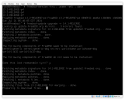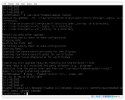Hi,
I am looking for help trying to understand what is taking to so long.
I started a jail upgrade from 12.2 to 14.1 on Sunday. Previous ones have been long already, like one day. Okay. This one has been running for four days already. Here's the status:
It's been like this for at least three days, let's say, assuming the first one was used for the previous steps.
I can see it's running because install processes move on from file to file. But it's just painstakingly slow.
The server shows no CPU load, has over 20 GB free, no io (using top -m io -o total) now that I have solved a sendmail issue on another jail.
What could be causing this? Any ideas on how to find the issue? So hopefully I could at least try to solve it...
I am looking for help trying to understand what is taking to so long.
I started a jail upgrade from 12.2 to 14.1 on Sunday. Previous ones have been long already, like one day. Okay. This one has been running for four days already. Here's the status:
Code:
The following files will be updated as part of updating to
14.1-RELEASE-p2:
/.cshrc
/.profile
/COPYRIGHT
/bin/[
/bin/cat
/bin/chflags
/bin/chio
/bin/chmod /bin/cp
/bin/csh
/bin/date
/bin/dd
/bin/df
/bin/domainname
/bin/echo
/bin/ed
/bin/expr /bin/freebsd-version /bin/getfacl /bin/hostname
To install the downloaded upgrades, run 'tmpcviffpdx [options] install'. Installing updates... Kernel updates have been installed. Please reboot and run 'tmpcviffpdx [options] install' again to finish installing updates.
Installing updates...It's been like this for at least three days, let's say, assuming the first one was used for the previous steps.
I can see it's running because install processes move on from file to file. But it's just painstakingly slow.
Code:
root@vm:/home/lynx# ps auxww | grep install
root 51612 0.0 0.0 13456 8 0 IW+ - 0:00.00 /bin/sh /tmp/tmpcviffpdx -b /iocage/jails/accounting/root -d /iocage/jails/accounting/root/var/db/freebsd-update/ -f /iocage/jails/accounting/root/etc/freebsd-update.conf -r 14.1-RELEASE install
root 62514 0.0 0.0 13456 792 0 S+ Sun05 0:56.52 /bin/sh /tmp/tmpcviffpdx -b /iocage/jails/accounting/root -d /iocage/jails/accounting/root/var/db/freebsd-update/ -f /iocage/jails/accounting/root/etc/freebsd-update.conf -r 14.1-RELEASE install
root 89557 0.0 0.0 12864 2068 0 D+ 14:43 0:00.00 install -S -o 0 -g 0 -m 0755 d75abedf73ee99dc733ff00b2680c0869cf954bc00aefd0d7bdc276b87f96bc2 /iocage/jails/accounting/root//usr/src/tools/test/stress2/misc/nfs4.sh
root 89559 0.0 0.1 12888 2140 1 S+ 14:43 0:00.00 grep installThe server shows no CPU load, has over 20 GB free, no io (using top -m io -o total) now that I have solved a sendmail issue on another jail.
What could be causing this? Any ideas on how to find the issue? So hopefully I could at least try to solve it...



